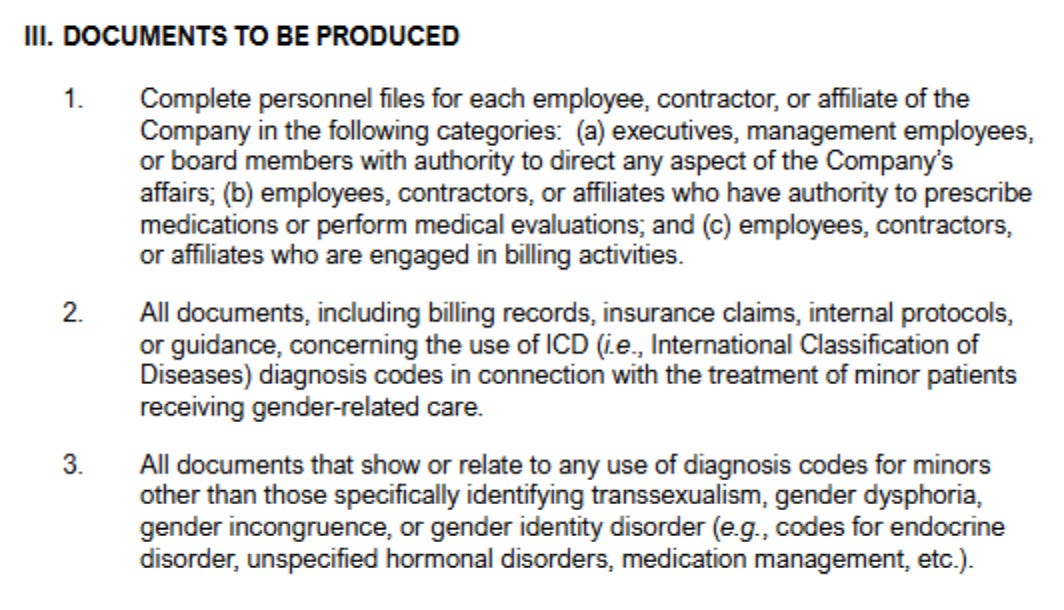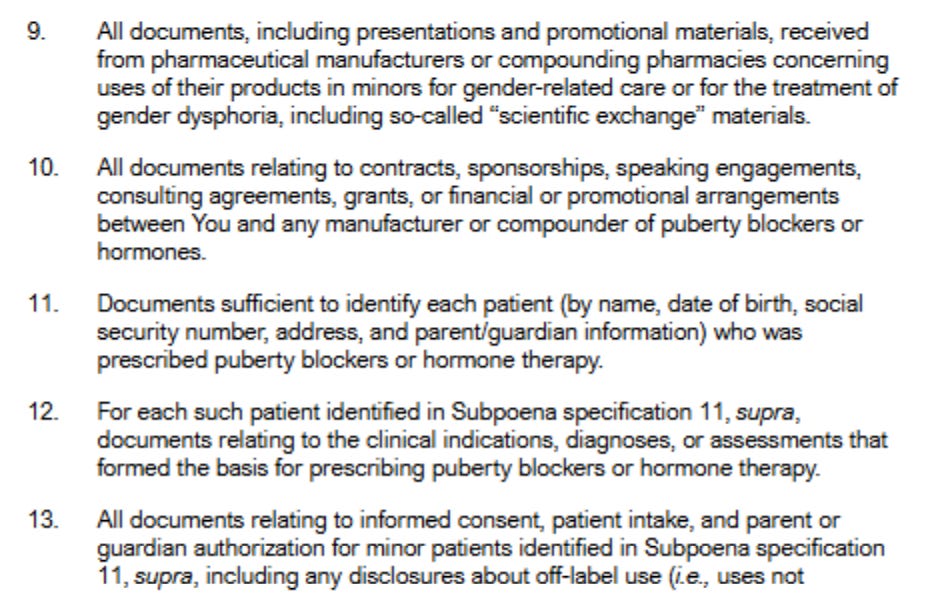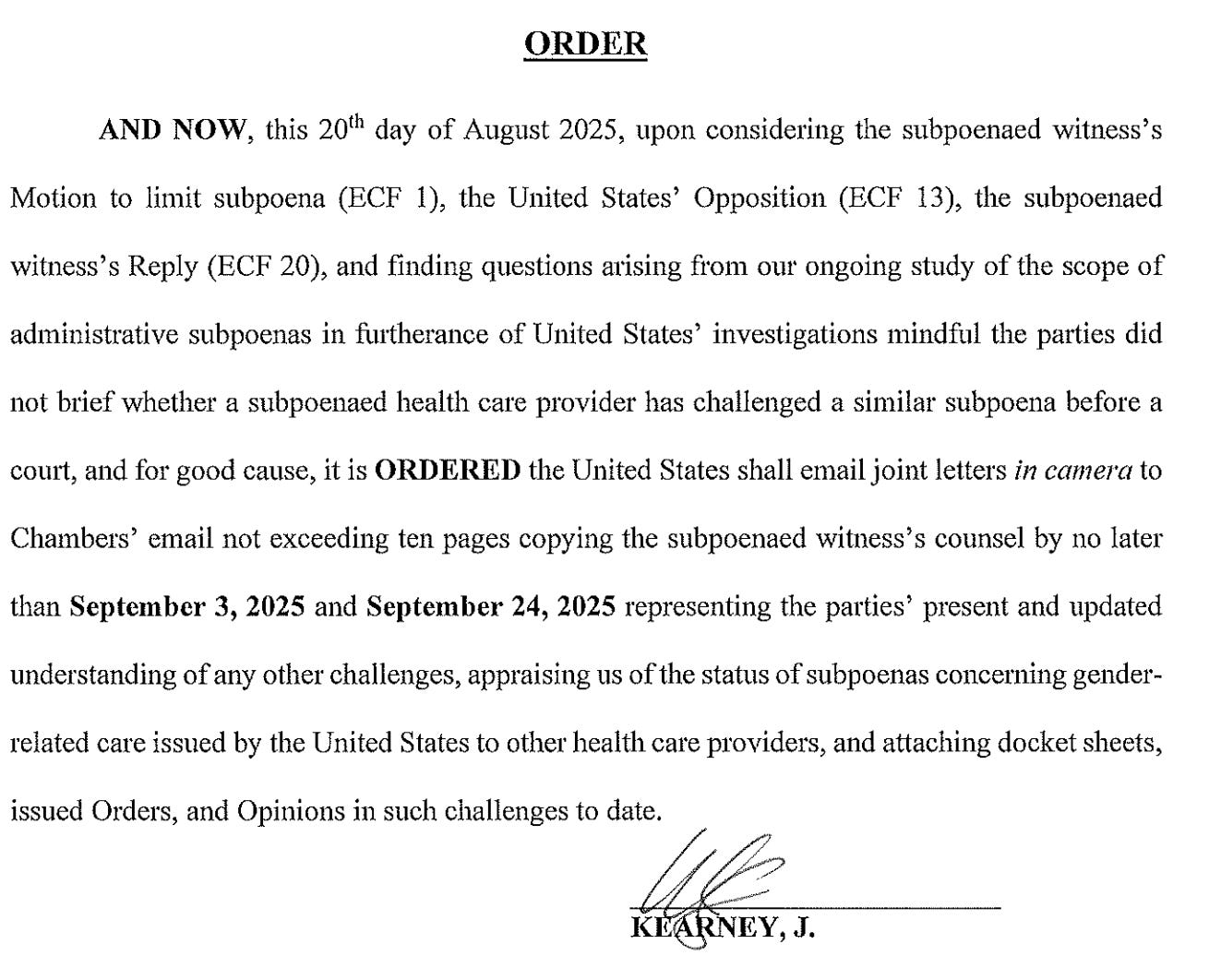Judge orders DOJ to give more info on subpoenas targeting trans minors' medical care
Children's Hospital of Philadelphia staff warned of "traumatic" effects if forced to provide patient information to the Trump admin. DOJ called the claims "meritless."
A federal judge on Wednesday ordered the Trump administration to provide information in two weeks about the scope of the Justice Department’s unprecedented investigation into the provision of gender-affirming medical care for those under 19 across the country — including in states where the provision of such necessary care is legal.
The order from U.S. District Judge Mark Kearney came in a challenge filed by one of the hospitals targeted in the Justice Department’s attack on the provision of such care for minors. DOJ’s actions broke widely on Wednesday in multiple news reports, although Kearney’s Wednesday order is first being reported at Law Dork.
The Justice Department has been — since at least from when Attorney General Pam Bondi issued a memorandum in late April — looking into the provision of gender-affirming medical care for minors under several questionable-at-best authorities, including laws prohibiting female genital mutilation and the Food, Drug, and Cosmetic Act’s ban on “misbranding.”
As Casey Parks and David Ovalle reported at The Washington Post on Wednesday afternoon, however, that investigation took a turn in June, when the Justice Department issued subpoenas to nearly two dozen medical providers involved in such care. Although the existence of the subpoenas had been known since July, the Post was the first outlet to report on the contents of one of those subpoenas, which the Post reported had been filed in court in Washington state.
The subpoena in question, issued to the Children’s Hospital of Philadelphia1 (referred to in court documents often as “CHOP”), is extremely invasive — not only as to the medical providers but, relevant here, as to their patients.
Below find the full list of documents sought by the Justice Department in the subpoena:
The Post story referred to the subpoena as being filed in the Washington state federal court challenge to Trump’s executive order targeting gender-affirming medical care for those under 19 as further evidence in that case.
But, as detailed in a follow-up report from Ben Penn and Ian Lopez at Bloomberg Law on Wednesday evening, the subpoena was initially filed in CHOP’s challenge to the subpoena across the country in federal court in Philadelphia. (Notably, Bloomberg Law also reported that two sources told the outlet that “the career official directing the consumer protection branch … declined to sign the subpoena, along with multiple others directed at children’s hospitals,” leading the head of the Civil Division, Brett Shumate, to sign the subpoena “within a few hours of being sworn into office June 11.“)
In the challenge, CHOP is seeking an order narrowing the subpoena as to 11, 12, 13, and any other provision that would “call for the production of health information of CHOP patients.“
That challenge was filed on July 8 — the day before the subpoena had set for compliance — but it was initially filed under seal. Judge Kearney, an Obama appointee, quickly issued a stay of compliance as to the challenged sections while he considered the request.
Although CHOP sought to keep the filings in the matter sealed while being litigated, the Justice Department opposed the request — an unusual move, Bloomberg Law’s report detailed — and Kearney, in a pair of orders in late July and early August, unsealed the filings and orders in the challenge.
Those filings, however, lay out the stark reality — and dangers — of this moment, especially coming in the wake of June’s decision from the U.S. Supreme Court upholding the constitutionality of Tennessee’s ban on gender-affirming care for transgender minors.
As a declaration from the co-founders and co-directors of the Gender & Sexuality Development Program at CHOP detailed, the concerns about the Justice Department’s subpoena are substantial:
It could, given the Trump administration’s actions already, get far worse:
In response, DOJ asserted on August 4 that CHOP’s objections to the subpoenas are “meritless.”
CHOP filed its reply in support of the challenge on August 11, leading to Wednesday’s order from Kearney:
Because Kearney ordered the the letters to be filed “in camera,” that means it will just go to the court — and the “subpoenaed witness’s counsel” — and not be placed on the public docket.
But, on September 3, Kearney will get a better picture of several aspects of this investigation — including whether other medical providers filed similar challenges and whether any courts have already blocked parts of the subpoenas.
Law Dork will have more on this story as circumstances warrant.
If you have information about the Justice Department’s investigation into gender-affirming medical care for those under 19 — or providers’ responses — please reach out to Chris Geidner via email or on Signal at crg.32 from a non-work phone.
The name after the hospital was corrected shortly after publication. It is the Children’s Hospital of Philadelphia — not Pennsylvania, as initially reported.













So much effort dedicated to intimidating - harming - a small minority seeking medical treatment … this is justice?
The targeted hospitals and medical staff of these subpoenas better vigorously fight against the subpoenas, and go to court for this invasion of medical privacy laws. This radical right-wing regime has no right directing their personal hatred of trans persons to intimidate and harass people, and to prevent trans medical care. What would right-wing fanatics do if a federal administration forced all humans born with a penis to undergo mandatory vasectomies? I bet they'd call that massive overreach of their privacy. So is dictating that lawmakers and administrations can forbid trans care, and women's right to their own reproductive organs care. The ERA needs to be revised, and passed, with a provision that no lawmaking body in the US can enact any law regarding medical care in the US. That only a physician or medical provider with a patient can decide medical care.